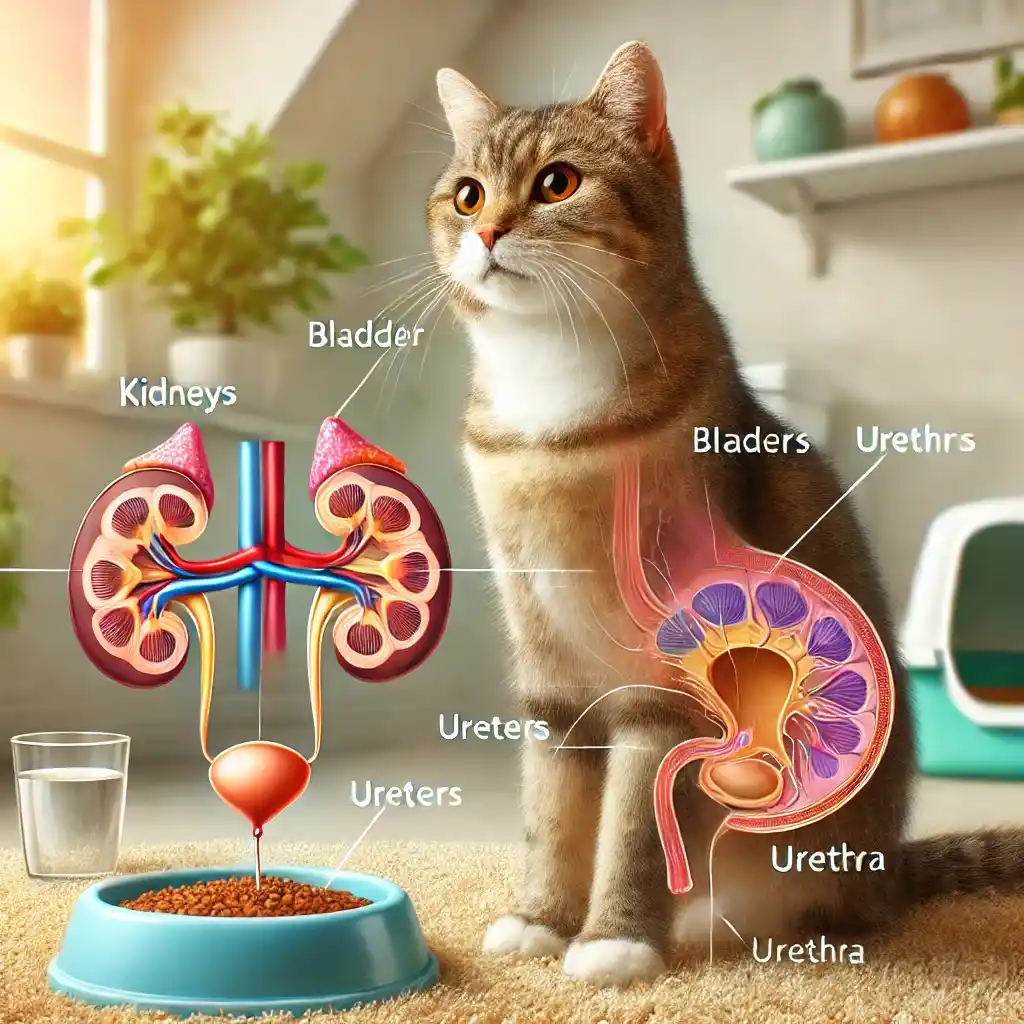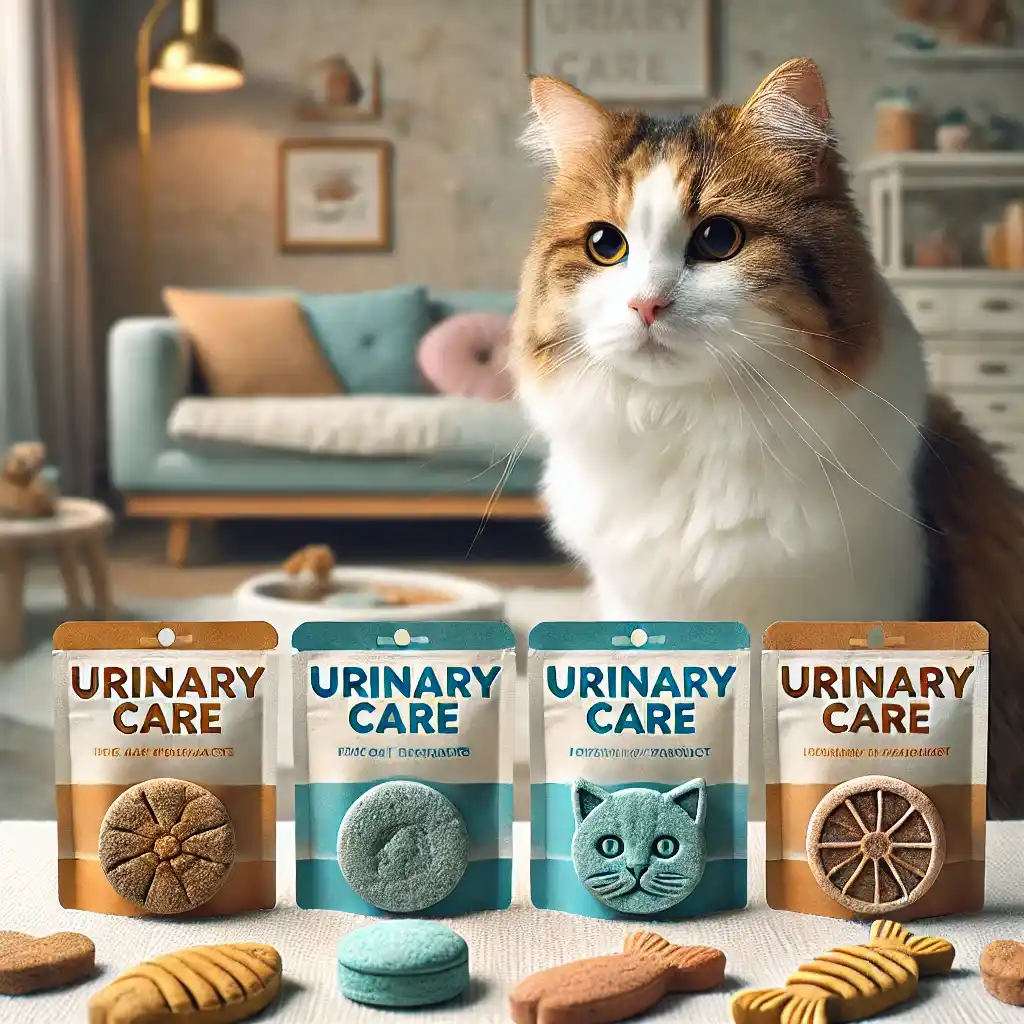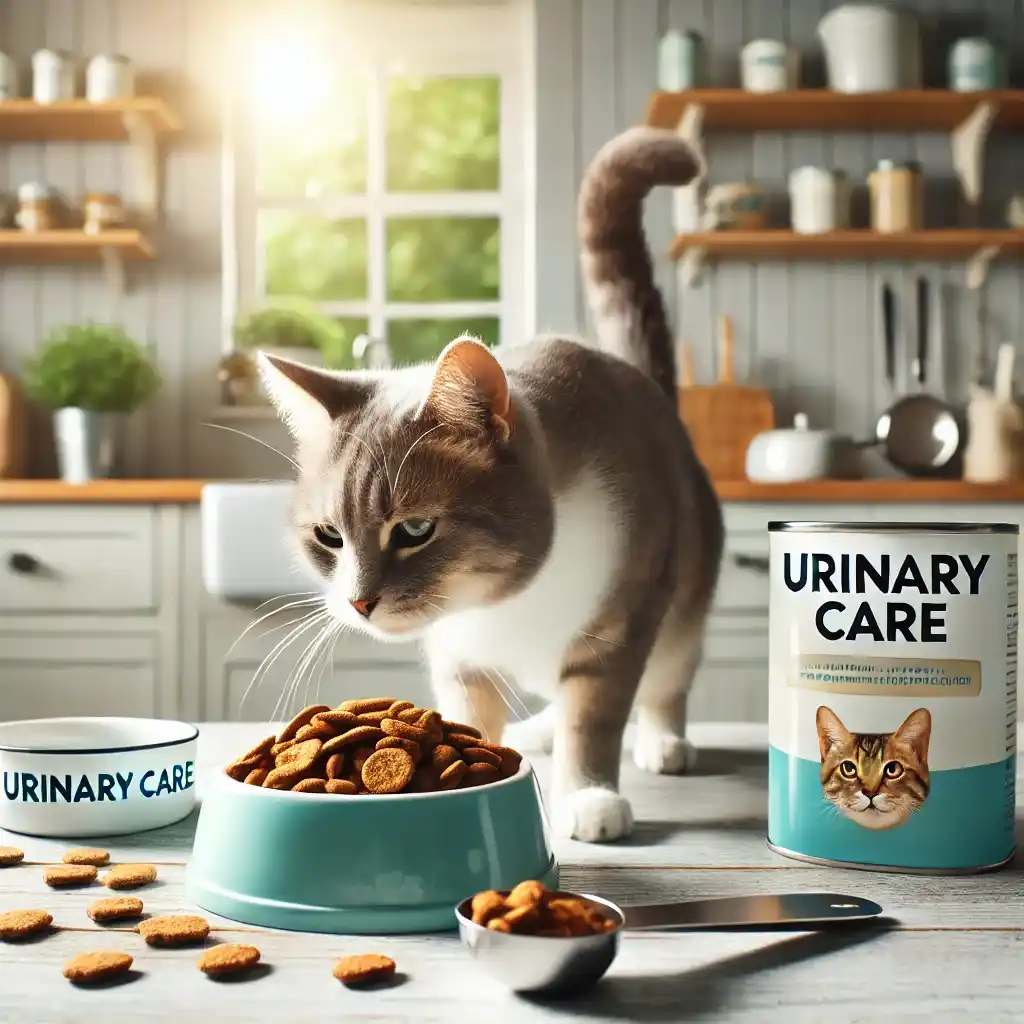Urinary health is one of the most important aspects of a cat’s well-being. Urinary tract problems are common in cats and can lead to pain, discomfort, and more serious conditions like infections, bladder stones, and even life-threatening situations. One of the most effective ways to support your cat’s urinary health is by providing urinary care cat treats. In this article, we’ll explore everything you need to know about urinary care cat treats, from understanding their benefits to how to select the right treats for your furry friend. Let’s get started!
1. Introduction to Urinary Health in Cats
Importance of Urinary Health
A cat’s urinary system is responsible for producing, storing, and excreting urine.”It includes the kidneys, bladder, ureters, and urethra, all of which work together to filter waste and manage the production and elimination of urine. These organs work together to filter waste and excess water from the blood, producing urine. When any part of this system is disrupted, it can lead to severe health issues.
Urinary tract problems are common in cats, especially as they age. If untreated, these issues can cause serious health problems such as kidney failure, urinary blockages, and chronic urinary tract infections. Keeping your cat’s urinary system healthy is essential to ensure they lead a long and comfortable life.

Common Urinary Issues in Cats
Several urinary problems can affect your cat, and some are more common than others. The most frequent urinary problems in cats are
- Urinary Tract Infections (UTIs): UTIs are one of the most common reasons cats visit the veterinarian. A UTI occurs when bacteria invade the urinary system, leading to inflammation, discomfort, and sometimes more severe complications. Cats with UTIs may exhibit symptoms such as frequent urination, difficulty urinating, or blood in the urine.
- Feline Lower Urinary Tract Disease (FLUTD): FLUTD is a group of conditions that affect the bladder and urethra in cats. Symptoms can include difficulty urinating, frequent urination, or urinating outside the litter box. FLUTD may be caused by infections, bladder stones, or stress.
- Bladder Stones and Crystals: Bladder stones are hard deposits that form in the bladder. They can cause pain, blockages, and infections. In certain situations, surgery may be necessary to remove them. Crystals in the urine are often a precursor to bladder stones. These can form when the urine is too alkaline or too concentrated.
- Urinary Blockage: Male cats, in particular, are at risk for urinary blockages due to their narrow urethras. A blockage occurs when crystals, stones, or mucus block the urethra, preventing the cat from urinating. This condition can be life-threatening and demands urgent veterinary attention.
2. Understanding Urinary Care Cat Treats
What Are Urinary Care Cat Treats?
Urinary care cat treats are specially formulated treats that help support your cat’s urinary health. They contain ingredients designed to promote bladder health, reduce the formation of crystals and stones, and prevent urinary tract infections. Urinary care treats are typically recommended for cats who are prone to urinary tract problems or are recovering from a urinary issue.
These treats are made with high-quality ingredients such as cranberry extract, omega-3 fatty acids, and herbs that have been shown to have a positive effect on urinary health. They may also include ingredients like DL-Methionine, which helps acidify the urine and prevent the formation of crystals.
How They Differ from Regular Treats
Urinary care cat treats differ from regular cat treats in several ways. First and foremost, they are formulated with the specific goal of promoting urinary health. Regular treats, while tasty, may contain ingredients that are not beneficial for your cat’s urinary system, such as high levels of magnesium and phosphorus. These minerals can play a role in the development of urinary crystals and bladder stones.
Urinary care treats are often low in magnesium and high in ingredients like cranberry extract, which helps prevent urinary tract infections. Additionally, they may be designed to be low in calories, making them a great option for cats who need to maintain a healthy weight while receiving the urinary support they need.
3. Key Ingredients in Urinary Care Cat Treats
Beneficial Ingredients for Urinary Health
When choosing urinary care cat treats, it’s important to look at the ingredients. Here are some of the key ingredients that are commonly found in urinary care treats and their benefits for your cat’s urinary health:
- Cranberry Extract: Cranberries are rich in antioxidants and have been shown to help prevent urinary tract infections. The active compounds in cranberries can prevent bacteria from attaching to the walls of the urinary tract, reducing the risk of infections. Cranberry extract also supports bladder health and reduces inflammation.
- Omega-3 Fatty Acids: These healthy fats are recognized for their ability to reduce inflammation.. These fatty acids help reduce inflammation in the urinary tract and promote overall bladder health. They also support your cat’s immune system and can improve their skin and coat condition.
- DL-Methionine: This amino acid is commonly used in urinary care cat treats because it helps acidify the urine. By making the urine more acidic, DL-Methionine can help prevent the formation of struvite crystals, which can lead to bladder stones and infections.
- Pumpkin: Pumpkin is an excellent source of fiber, which helps regulate digestion and promote healthy urine production. It also has mild diuretic properties, helping to flush out toxins and bacteria from the urinary tract.
- Hibiscus: Some urinary care treats may include hibiscus, a natural diuretic that helps to flush out excess minerals and toxins from the urinary system. It also contains antioxidant properties that aid in promoting overall health.

Harmful Ingredients to Avoid
While urinary care cat treats contain beneficial ingredients, there are also some ingredients that you should avoid. These include:
- High Levels of Magnesium: Magnesium can contribute to the formation of urinary crystals and stones, particularly in cats who are predisposed to urinary tract issues. When choosing urinary care treats, make sure they are low in magnesium.
- Artificial Additives or Preservatives: Many commercially available treats contain artificial colors, flavors, and preservatives, which can irritate your cat’s urinary system. It’s best to avoid treats that contain these ingredients, as they can cause unnecessary health problems.
- Excessive Fillers: Some treats contain fillers such as corn, soy, or wheat, which may not provide any nutritional benefits and could potentially irritate your cat’s digestive system. Look for treats that use high-quality, natural ingredients instead of fillers.
4. How Urinary Care Cat Treats Support Bladder Health
Prevention of Crystals and Stones
One of the most important roles of urinary care cat treats is to prevent the formation of bladder stones and crystals. These stones can cause severe pain, blockages, and even require surgical removal. Urinary care treats contain ingredients like DL-Methionine and cranberry extract, which help maintain the proper pH balance in the urine and prevent crystals from forming.
Struvite crystals, which are formed in alkaline urine, can lead to painful urinary blockages, particularly in male cats. By promoting an acidic urine pH, urinary care treats help prevent the formation of these crystals.
Managing Urinary Tract Infections
Urinary tract infections are common in cats and can lead to severe complications if left untreated. Cranberry extract, a common ingredient in urinary care treats, helps reduce the risk of UTIs by preventing harmful bacteria from attaching to the walls of the urinary tract. This reduces the likelihood of infection and supports overall urinary health.

Urinary care treats can also help strengthen your cat’s immune system, making them less prone to infections. Omega-3 fatty acids help reduce inflammation in the urinary tract, promoting faster healing if your cat does develop an infection.
5. Top 5 Urinary Care Cat Treats on the Market
Product Reviews and Comparisons
Here are five of the best urinary care cat treats available on the market today:
- Hill’s Prescription Diet c/d Multicare Urinary Care Cat Treats
- Description: These treats are specifically formulated to help dissolve struvite stones and prevent their formation. They are also enriched with antioxidants and have a low magnesium content.
- Pros: Effective for bladder health, helps manage struvite crystals, and has a tasty flavor that cats love.
- Royal Canin Urinary Care Cat Treats
- Description: Designed to support overall urinary health, these treats help maintain a healthy bladder and prevent urinary tract infections. They are low in magnesium and contain essential nutrients.
- Pros: Helps reduce urinary tract problems and maintains a healthy urinary system.
- Purina Pro Plan Veterinary Diets UR Urinary Care Cat Treats
- Description: These treats help maintain urinary tract health by promoting an ideal urinary pH. They are formulated with high-quality ingredients and are recommended by veterinarians.
- Pros: Ideal for cats prone to urinary tract issues and easily digestible.
- VetriScience Laboratories Bladder Strength Cat Chews
- Description: A natural formula with cranberry extract and other ingredients to support bladder function and reduce the risk of urinary tract infections.
- Pros: Contains natural ingredients, supports bladder health, and is easy to administer.
- PetSafe Healthy Pet Simply Feed Urinary Cat Treats
- Description: Made with real ingredients and designed to support a healthy urinary tract, these treats are a great addition to your cat’s diet.
- Pros: All-natural ingredients and high in fiber for overall health.

Key Features to Look for
When choosing urinary care cat treats, make sure they are
- Low in magnesium to prevent the formation of urinary crystals.
- High in beneficial ingredients such as cranberry extract, omega-3 fatty acids, and DL-Methionine.
- Free from artificial preservatives, colors, and flavors.
6. How to Choose the Right Urinary Care Cat Treats
Factors to Consider: Age, Health, and Diet
Choosing the right urinary care cat treats requires careful consideration of your cat’s age, health condition, and dietary needs. Here are several important factors to consider:
- Age: Cats’ nutritional needs change as they age. Kittens, adult cats, and senior cats have varying nutritional needs. For example, senior cats may need treats with additional joint support, while kittens need treats tailored to their growing bodies. Choose treats formulated for your cat’s specific age group to ensure they are receiving the right balance of nutrients.
- Health Conditions: If your cat has a pre-existing health condition such as kidney disease, diabetes, or obesity, it’s important to select urinary care treats that cater to their specific health needs. Some treats are designed for cats with sensitive stomachs or specific dietary restrictions, such as grain-free or low-calorie options. If your cat is prone to urinary tract infections or bladder stones, make sure the treats contain ingredients that help acidify urine and prevent crystal formation.
- Diet: The type of food your cat eats will also influence the type of treats they need. For example, if your cat is fed wet food, they may require treats that provide extra support for bladder health, as wet food tends to have higher moisture content, which can support hydration. Dry food-fed cats may need more assistance with urinary tract care, as they may not drink enough water on their own. The treats should complement your cat’s regular diet to avoid imbalance.
Consulting Your Veterinarian for Recommendations
Before introducing any new product into your cat’s diet, it’s a good idea to consult with your veterinarian. Your vet knows your cat’s specific health needs and can help you select the most appropriate urinary care treats. A veterinarian’s guidance is especially important if your cat has been diagnosed with a urinary issue or if you have concerns about their diet or overall health.
Veterinarians can recommend specific brands or formulas based on your cat’s medical history, breed, and other factors. They can also suggest appropriate quantities, ensuring that your cat receives the right amount of urinary care support without overconsuming treats that could lead to weight gain or other health issues.
7. Incorporating Urinary Care Cat Treats into Your Cat’s Diet
Recommended Feeding Guidelines
Incorporating urinary care cat treats into your cat’s daily routine should be done gradually to ensure that your cat gets used to them. Follow the manufacturer’s feeding instructions for best results, but here are some general guidelines:
- Treats as a Supplement: Urinary care treats should not replace your cat’s regular meals. They are meant to be a supplement to their diet. Typically, one to two treats per day are sufficient, depending on your cat’s size, weight, and overall health. Always follow the recommended guidelines on the packaging for specific amounts.
- Introduce Gradually: If your cat is not used to urinary care treats, introduce them gradually to avoid upsetting their stomach. Start with one treat every other day and increase the frequency once your cat becomes accustomed to the new treats.
- Complement with Wet Food: Wet food can complement urinary care treats by promoting hydration, which is important for maintaining urinary health. This is especially helpful for cats that don’t drink enough water on their own

Dosage and Frequency
The correct dosage and frequency of urinary care cat treats can vary depending on the specific brand and formula. Generally, you can feed your cat 1-2 treats per day as a supplement to their regular diet. However, it is always best to adhere to the manufacturer’s recommendations or your vet’s advice.
Remember that urinary care treats are not a substitute for regular meals. They should be treated as a healthy snack or an additional source of support for your cat’s urinary system. Overfeeding treats can lead to weight gain, so be mindful of the overall caloric intake when incorporating treats into your cat’s diet.
8. Signs Your Cat May Need Urinary Care
Recognizing Symptoms of Urinary Problems
It’s important to keep an eye out for symptoms that could indicate your cat is having urinary issues. Some common signs include:
- Frequent Urination: If your cat is urinating more frequently than usual, it may be a sign of a urinary tract infection (UTI) or bladder stones. This is especially concerning if the frequency is accompanied by straining.
- Straining or Painful Urination: If your cat is struggling to urinate or seems to be in pain when doing so, it could indicate a blockage or infection. Cats may also exhibit signs of discomfort by meowing or pacing around the litter box.
- Blood in the Urine: Blood in your cat’s urine is a serious symptom and should not be ignored. It may be caused by a urinary tract infection, bladder stones, or trauma to the urinary system.
- Urinating Outside the Litter Box: If your cat is urinating outside of the litter box, it could be a sign of a medical issue. Cats instinctively use litter boxes, and urinating outside of it is often associated with a urinary tract infection or other urinary problem.
- Excessive Licking of the Genital Area: Cats with urinary discomfort may lick their genital area excessively in an attempt to soothe the pain or irritation. If you notice this behavior, it may indicate that your cat is experiencing urinary issues.
When to Seek Veterinary Attention
If you observe any of these symptoms, it’s crucial to seek veterinary care promptly A urinary tract blockage, in particular, is a medical emergency that requires immediate intervention. Cats can quickly become very ill if they are unable to urinate, so don’t delay in seeking professional help.
Even if your cat’s symptoms seem mild, such as occasional straining or excessive licking, it’s always better to err on the side of caution. Your veterinarian can help identify the underlying cause of your cat’s urinary issues and recommend the appropriate treatment.
9. Maintaining Overall Urinary Health for Your Cat
Diet and Lifestyle Tips for Prevention
Prevention is key when it comes to maintaining urinary health. Here are a few tips to keep your cat’s urinary system in good shape:
- Provide Fresh Water at All Times: Hydration is essential for preventing urinary issues. Make sure your cat always has access to fresh, clean waterr. Cats who are well-hydrated are less likely to develop concentrated urine, which can contribute to the formation of crystals and stones.
- Feed a Balanced Diet: A balanced diet is crucial for your cat’s overall health, including their urinary system. Make sure your cat is eating a high-quality food that is appropriate for their age, breed, and health needs. If your cat is prone to urinary issues, consider feeding them a diet specifically formulated for urinary health.
- Encourage Regular Exercise: Regular physical activity helps maintain your cat’s overall health, including their urinary system. Cats that are overweight or sedentary may be at higher risk for developing urinary tract problems, so encourage playtime to help your cat stay active.
The Role of Hydration in Urinary Health
Hydration is one of the most important factors in maintaining your cat’s urinary health. Cats who are not adequately hydrated are at higher risk for urinary tract infections, crystals, and bladder stones. Cats may not always drink enough water on their own, which is why wet food can be a great addition to their diet. Wet food contains a significant amount of water, which can help keep your cat hydrated.
10.Difference between Possible Cause and Urgency
| Symptom | Possible Cause | Urgency |
|---|
| Frequent urination | Urinary tract infection, bladder stones, crystals | Requires veterinary evaluation |
| Straining or painful urination | Urinary blockage, infection, or bladder stones | Urgent – potential medical emergency |
| Blood in the urine | Urinary tract infection, bladder stones, or trauma | Requires immediate veterinary attention |
| Urinating outside the litter box | UTI, bladder stones, stress-related FLUTD | Veterinary visit recommended |
| Excessive licking of genital area | Irritation, UTI, bladder stones | Veterinary evaluation recommended |
11.FAQs
1. What are urinary care cat treats?
Urinary care cat treats are specially formulated snacks designed to support your cat’s urinary health. They contain ingredients like cranberry extract and omega-3 fatty acids, which help reduce inflammation, prevent urinary tract infections, and maintain a healthy bladder. These treats complement your cat’s regular diet and prevent urinary issues like bladder stones.
2. How do urinary care treats help prevent bladder stones?
Urinary care treats help maintain an acidic urine pH, which prevents the formation of bladder stones, especially struvite crystals. Ingredients like DL-Methionine acidify the urine, reducing the chances of crystals and stones forming, thus supporting bladder health and preventing painful blockages.
3. What key ingredients are in urinary care cat treats?
Common ingredients in urinary care cat treats include cranberry extract, which helps prevent urinary tract infections, omega-3 fatty acids for anti-inflammatory benefits, DL-Methionine for urine acidification, and pumpkin for digestive and urinary system support. These ingredients work together to ensure healthy urinary function.
4. When should I seek veterinary attention for my cat’s urinary issues?
If your cat shows signs such as frequent urination, straining, blood in the urine, or urinating outside the litter box, it’s time to consult a vet. These symptoms may indicate a urinary tract infection, bladder stones, or other serious conditions that require immediate veterinary care.
5. How can I maintain my cat’s urinary health?
To maintain urinary health, ensure your cat is well-hydrated by providing fresh water and feeding wet food. Use urinary care cat treats as a supplement, provide a balanced diet, and encourage regular exercise. Regular vet check-ups also help in preventing and managing urinary issues effectively.
12.Conclusion
Maintaining urinary health in cats is crucial for their overall well-being, and urinary care cat treats play a vital role in supporting bladder function, preventing urinary tract infections, and reducing the risk of bladder stones and crystals. By incorporating the right treats into your cat’s diet, staying vigilant for symptoms of urinary issues, and consulting your veterinarian, you can ensure your feline friend stays healthy and comfortable. Along with providing proper hydration, a balanced diet, and regular exercise, these preventive measures will help maintain your cat’s urinary health for years to come
